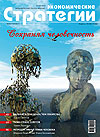Preserving humanness
Opening address of editor-in-chief.

Opening address of editor-in-chief.
A series of terrorist attacks in Paris, plane crashes, explosions in different cities around the world, a terrorist war against the legitimate government in Syria, the terror in Russia’s North Caucasus — all these phenomena called forth the problem of ongoing processes of the terrorist component expansion in the global geo-strategic players’ activities like regularity pattern manifesting the systemic crisis of the western world order model. Geostrategic nature of terrorist operations is an integral part of the globalized competition in contemporary geo-economic and geopolitical environment. It is necessary to comprehend the new macro-terroristic reality and to develop measures to confront qualitatively new risks and threats to our country’s security and whole world’s.
The article examines the role of the deoffshorization (counteraction to base erosion and profit shifting) in improving of the globalizing world, its connection with money laundering and place in the emerging system of global governance.
Strategic potential rating of telecommunications companies in Russia is compiled according to the original methodology of the Institute for Economic Strategies, based on assessment of nine key fundamentals: quality of management, resource potential, finance, product quality, interaction with investors, motivation effectiveness, corporate culture, market position, innovation efficiency.
Information technologies maintain high rates of development. The largest contribution comes from the analytics, Internet of things, recording density increase, 3D-printing, cloud technologies, as well as from network and information security. The article analyzes the IT situation in 2014 – 2015.
Currently, the issue of mobile payments application while forming the independent national payment system is one of the most urgent. Since the transition to mobile payment systems in Russia, as well as introduction of security systems against their break-in require certain costs, in the current economic conditions credit institutions should have sufficiently serious motivation for the new systems introduction. While business revenues are going down, increased spending for new systems introduction may seem irrational strategy. However, the positive side of mobile payments is that they will allow to reduce capital expenditures, taking into account that introduction technologies have been already developed, they should not be re-created. Further widespread use of mobile payments is inseparably connected with ensuring the required security level. The article examines the main threats that consumers could face while paying for goods and services via mobile phone.
Changing of a conjuncture index of “Economic strategy” (CIES) for the january — october 2015 is considered. The contribution of indicators of supply and demand in CIES is estimated. The analysis of industrial production is carried out.
The article discusses two approaches to assessing the relationship between Science (grasping principles of nature) →Engineering (application of science) →Technology and Innovation (making engineering useful for public good and/or commercial gain) and their role in formation of economy. It is considered in relation to the Soviet history and economic development as well as in conjunction with planning, social policy and education. The philosophy of the process is at attempt to be analysed the achievement of the status of the superpower.
The problem of raising the retirement age in our country has been under discussion from the very outset of pension insurance market reforms, is for a quarter of a century, and without any apparent progress towards its solution. At the same time, all civilized countries have already developed a clear action program to address this problem, although with different social and economic consequences: some of them raised the pensionable age in one-two years, using shock instruments, some of the countries distended this process for decades, others renounced the age regulator of pension insurance rights. In the current socio-economic conditions the problem of raising retirement age in Russia has become especially acute.
The paper is devoted to consideration of assisted reproductive technologies (ART) in the context of social changing. ART raise many medical, social, ethical, political and religious questions, often leading to controversial and sometimes inaccurate opinions about the outcomes of pregnancies resulting from these techniques. We analyze the process of ART implementation in Russia. Such consequences as new types of social inequality and new forms of social mobility, new aspects of kinship, transforming traditional social roles are focus of our interest. Using and distribution of ART do not simply reflect the existing structure of the socio-economic differentiation, but produce new configurations of inequality both globally and within countries, particularly in the area of reproductive rights and reproductive health. Access to ART depends on social status, gender, economic status, religious beliefs and national characteristics for different social groups. We also can speak about reproductive bioeconomics where the reproductive labor e.g. surrogate motherhood is a central element and reproductive tissues are main objects to be exchanged. ART may be considered a great example how modern science and technology may influence social relations and social practices.